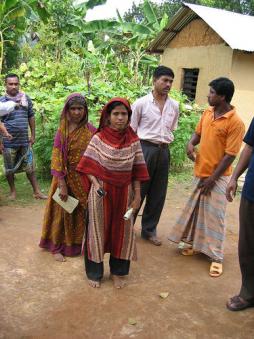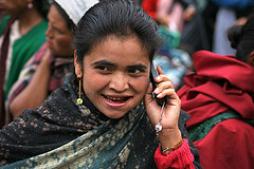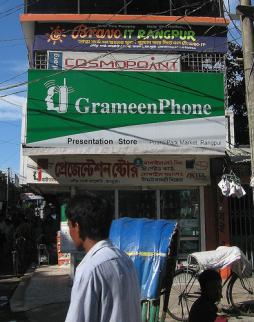Grameen
Posted by KatrinVerclas on Sep 19, 2007
Grameen Foundation's Village Phone program has long been touted as the poster child for using mobiles in the economic empowerment of poor women. The program gives villagers in Bangladesh-- and now in several other countries -- access to microcredit to buy a mobile phone that can then be rented to other villagers who do not have a mobile of their own.
Much has been written about Village Phones in the media and in research reports, often describing in glowing terms the economic impact and gain in social status that the women in the program have achieved. Yet, most of these studies are fairly old at this point, predating the exponential growth of mobiles around the world.
Now questions are being raised in some mainstream media about whether renting out minutes on mobile phones is economically beneficial to the so-called village phone operators -- at a time when mobiles have become so much more ubiquitous, even in remote rural areas.
Posted by CorinneRamey on Apr 02, 2008
In 2005, Samsung released a phone designed especially for women. The phone, with a "curvaceous, feminine design" included applications like a fragrance and aromatherapy guide, a shopping list, a calorie counter, a biorhythm clock, and a calendar to help women keep track of their periods. "Almost every woman will desire it," wrote one reviewer, in a piece entitled "High tech for the ladies."
Those marketers and reviewers have it all wrong.
For women around the world, mobile phones are not about sexy designs and knowing when it's that time of the month. Mobile phones are slowly changing the lives of women who use them and the communities in which they live. They've created a path out of poverty for many women in the developing world, as microfinance and "phone ladies" running businesses increase in numbers. Mobiles are enabling translation for victims of domestic violence in the United States, provide Ukrainian sex workers a way to safety, and protect Philippine domestic workers in the Middle East. Mobile phones are giving voice to female reporters in Africa and encouraging free speech in Egypt. And as mobile phones become increasingly ubiquitous -- they're already at 3.3 billion and counting -- they are likely to continue to influence the lives and societies of the women who use them in the future.
Posted by CorinneRamey on Oct 08, 2007
Abu Sufian's small room in Fultola, Bangladesh looks like a standard Internet cafe. There are four workstations -- each with a mouse, keyboard, and monitor -- where customers can check email or browse the Internet. But this isn't just any Internet cafe -- the center is all made possible by one mobile phone.
According to this article from Telecentre.org, this "Community Information Center" only has one computer, which acts as a server for the other workstations. Internet access is provided by the EDGE-enabled (Enhanced Data Rates for GSM Evolution) mobile phone. From the article:
Posted by Bonnie Bogle on Oct 13, 2006
In very exciting news, microcredit pioneer Muhammad Yunas and the Grameen Bank he founded have won this year’s Nobel Peace Prize for their work bringing people out of poverty in Bangladesh. This is a great win for everyone who believes that the path to peace is through ending poverty and that technology can help achieve this.
Yunas came up with the concept of microfinance, which has made it possible for millions of Bangladeshis to rise out of poverty. He has also made great strides in bringing technology to poor areas in Bangladesh, particularly cell phones.
The Grameen Phone initiative uses cell phones for economic development. How it works is that banks give loans so people can purchase mobile phones and in turn rent them out to others in their villages. These phones are often the first access entire villages have to a telephone. Not only do these phones make excellent businesses for the people who manage them, but they also make it possible for everyone in the town to work more efficiently through faster communications. A case study about this program is available here. I’ve also written about it here.
And not surprisingly, access to mobile technology is bringing about the development of innovative new tools to meet Bangladeshi’s specific needs. One example is the service Cell Bazaar, a kind of mobile Craig’s List that people can use to check prices before they buy or sell a product to make sure they are getting the best rate.
Congratulations Yunas and Grameen Bank. Your win is a great achievement for the movement behind using technology for social change, the field of microfinance, and everyone in Bangladesh.



